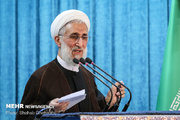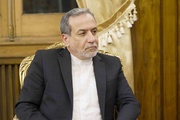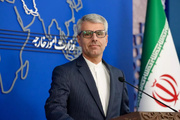Commenting on the recent agreement between the occupying forces and the interim Iraqi Governing Council, Hakim said, “Due to the recent situation, with the pressure that the United States is under, the upcoming U.S. presidential elections, and the large Shia population, the U.S. has agreed to hand over power to the people of Iraq by June 1, 2004.”
He stated that the constitution of
Hakim said that the government should be gradually handed over to the Iraqis according to UN Security Council Resolution 1511, but added that some important points about the transfer of power have been ignored.
According to this plan, the National Majlis should be established by
He stated that the members of the National Majlis would be chosen by a committee of 15 members from each of the 18 provinces of
Hakim said that 11 of the 15 members of these committees will choose 200 people from among the religious and academic experts and the nomads of
Hakim objected to several points of the plan, including the method of choosing provincial committees.
He said that the agreement contained the following seven errors:
1. The first problem is that the votes and viewpoints of the people have been ignored in this selection process. The provincial councils are chosen under the supervision of the occupying forces and the people have no role in their selection. The
2. There are no standards for the selection of the members of the National Majlis. For example, if 1000 people become candidates the committee must choose 200 people. This means that 800 people will be dismissed without any definite grounds and due to the presence of the occupying forces, those chosen will be those who are in agreement with and approved by the occupiers. Therefore, no seats will be left for the representatives of religious, academic, and nomadic groups.
3. The third issue is based upon UN Resolution 1511, according to which the only accepted and legal organization of the people has been identified as the interim Iraqi Governing Council. Due to the fact that the provincial councils are not under the authority of the interim Iraqi Governing Council but are under the direct supervision of the occupiers, the role of the interim Iraqi Governing Council is diminished, although it should have complete authority. The governor should not be chosen by the occupiers.
4. The fourth problem is that the United Nations has no role in this plan, although UN resolutions 1483 and 1511 state that the UN should have an essential role.
5. The fifth problem is that based on this plan, the interim Iraqi Governing Council will be dismissed, although the council has been approved by UN Security Council Resolution 1511 and has been accepted by many countries. This plan replaces a recognized organization, which is the interim Iraqi Governing Council, with an unrecognized alternative. To dismiss this government in 2004 without establishing the National Majlis beforehand is unacceptable.
6. The sixth problem is that in the draft resolution of the government of
7. The seventh issue is that based on the agreement on the governing of Iraq during the transfer of government power, the new government must sign an agreement with the U.S. forces which will allow them to remain in Iraq and will therefore authorize the continuation of the occupation of Iraq. Our problem is that there is no need for the occupying forces, and if there is a need it must be based upon the national interests of
Therefore, SAIRI disapproves of the agreement because it requires the transitional government to authorize the presence of the occupying forces in
JS/HG
End
MNA






















Your Comment